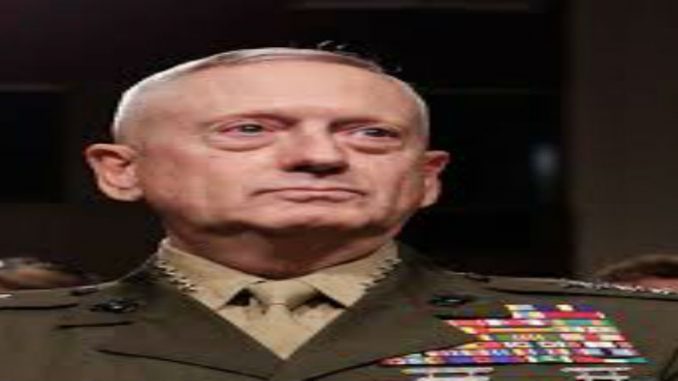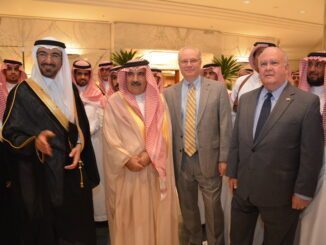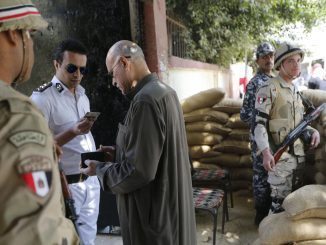
US defense secretary will meet with his counterparts in Saudi Arabia, Qatar and Egypt during his Middle East visit starting Tuesday to discuss strengthening security cooperation, according to the Pentagon.
U.S. Defense Secretary Jim Mattis will visit Saudi Arabia, Egypt, Israel, Qatar and Djibouti starting on Tuesday, the Pentagon said in a statement on Friday, reported Reuters.
James Mattis’ visit to the Middle East comes within the framework of the Trump Administration pursuit to reset Washington’s relations with traditional US partners in the Middle East.
The Pentagon said that during his tour, Mattis will aim “to re-affirm key US military alliances, to engage with strategic partners in the Middle East and Africa, and to discuss cooperative effort to counter destabilizing activities and defeat extremist terror organizations.”
It is worth mentioning that the former commander of the US military’s Central Command made his first trip to the Gulf in February,and met Sheikh Mohamed bin Zayed, Crown Prince of Abu Dhabi and Deputy Supreme Commander of the Armed Forces in Abu Dhabi.
He has maintained good relations with UAE leadership since his time at Centcom, but it was unclear whether UAE officials would be attending the talks in Riyadh.
The Pentagon said Mattis will meet key international counterparts “to strengthen commitments to the US-Saudi security partnership.”
In fact, US-Saudi relations soared badly under Barack Obama administration .
However, it seems that Donald Trump and his national security team is working on reaffirming ties with Gulf monarchies and Egypt over shared interests and place much less emphasis on differences such as human rights issues and political reform.
The main motive behind the White House’s shift is to focus on on Iran and its efforts to spread its influence across the Middle East as it engages in a cold war with arch-rival Riyadh.
Accordingly, the Saudi defense minister and deputy crown prince Mohammed Bin Salman met Trump and his senior foreign policy staff during a visit to the White House in February, where they discussed the conflicts in Syria and Yemen.
In the same context, the main US priority in Yemen is counter-terrorism and cooperation against ISIL and Al Qaeda. In addition, the new administration also sees Yemen as a potential theater for pushing back Iran, via the Houthi rebels that it supports there.
Therefore, how Gulf partners can bolster Trump’s strategy to combat ISIL and confront and contain Tehran will likely be at the top of the agenda in Riyadh.
The former Obama administration had reduced its intelligence and logistical support to the Saudi-led coalition in Yemen over concerns about civilian casualties and strategy, and had also halted some weapons sales.
However, Mattis has reportedly asked the White House to lift the restrictions on US support for the coalition’s campaign against Houthi rebels and their allies, and the administration is currently reviewing its Yemen policies, with a decision expected in the coming weeks.
Moreover, U.S defense secretary is also likely to discuss the US administration’s desire for GCC countries to play a larger role in the stabilization of areas in Iraq and Syria retaken from ISIL, including the possibility of safe zones for civilians in Syria.
During an interview with ABC News, US national security adviser Gen HR McMaster said,”What’s going to be really critical though is what forces can then establish enduring security in those regions that have a legitimacy with the population, that are representative of the population, that can set conditions for reconstruction to begin.”
Furthermore, Mattis is scheduled to visit Egypt for security talks and for a ceremony at Egypt’s Unknown Soldier Memorial. Washington has always perceives Egypt as a crucial security partner in the Middle East, and a key for its attempts to broker a peace deal between Israel and the Palestinians.
But U.S. and Egypt relations have soared under the former administration of Barack Obama, which admonished Cairo for its rights abuses following the military overthrow of Egypt’s first democratically elected President Mohammed Morsi.
In 2013,U.S. suspended military aid to Egypt before resuming it two years later, but Obama never extended an invitation to the Egypt’s military dictator after he assumed office in 2014 amid continued human rights violations.
Moreover, during Obama administration,”The State Department’s human rights report accuses Sisi’s government of stifling basic freedoms and enforcing its repression through torture, the disappearances of critics, and arbitrary arrests and killings.”
On the contrary, Trump’s flattering words to Egypt’s al-Sisi during his first official visit to the United Sates of America are considered a sharp shift from Obama Administration.
Trump said,”You have a great friend and ally in the United States and in me.”
He also said as he sat beside al-Sisi in the Oval Office,”We agree on so many things.” He added, “I just want to let everybody know in case there was any doubt that we are very much behind al-Sisi. He’s done a fantastic job in a very difficult situation. We are very much behind Egypt and the people of Egypt. The United States has, believe me, backing, and we have strong backing.”
Trump has set aside all of those concerns on human rights violations in Egypt , and while the White House has not decided to designate the Muslim Brotherhood as a terrorist organisation, as al-Sisi had hoped it would, it seems that it will give a green light to military sales financing and other economic support cooperation that Cairo was longing for.
In addition, an expected boost in U.S. support to Egypt as an Egyptian court acquitted Egyptian-American aid worker Aya Hegazy ,ahead of Mattis’ visit.
Hegazy’s release had been advocated by Obama officials and US lawmakers from both parties since her arrest in 2014.
The Pentagon also said that Mattis will also stop in Qatar to “continue efforts to strengthen regional security architectures.”
In fact, unlike Abu Dhabi or Riyadh, Doha has not had as close ties to the new Trump administration due to concerns in Washington over its relationships with Islamist groups, but it is an integral US partner and host to Centcom’s regional headquarters as well as an important player in the Syrian war.



